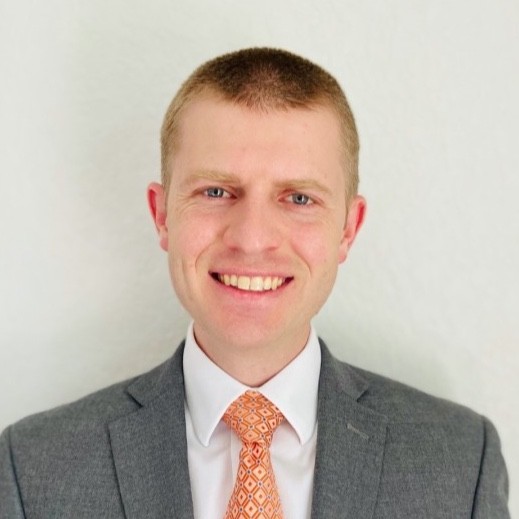Nourishing Ideas
April 23, 2021
|
Dorian Martin
Mays MBA Student Leads Aggie Team That Earns 3rd Place in International Case Competition Focused on Addressing International Food Production Problems
 A Texas A&M University interdisciplinary team led by Mays Business School Full-Time MBA student Ryan Staples ’22 earned third place in the 2021 Norwegian Business School Global Case Competition. The Aggie team–which included Danette Philpot, Garrett Brogan, and Meikah Dado, who are graduate students from the College of Agriculture and Life Sciences’ Department of Agriculture Leadership, Education and Communications—earned this international recognition by proposing an innovative use of technology to improve food production in Uganda by empowering women.
A Texas A&M University interdisciplinary team led by Mays Business School Full-Time MBA student Ryan Staples ’22 earned third place in the 2021 Norwegian Business School Global Case Competition. The Aggie team–which included Danette Philpot, Garrett Brogan, and Meikah Dado, who are graduate students from the College of Agriculture and Life Sciences’ Department of Agriculture Leadership, Education and Communications—earned this international recognition by proposing an innovative use of technology to improve food production in Uganda by empowering women.
The Mays-sponsored group competed against 85 teams from 60 top-tier universities to generate game-changing solutions to food production issues involving obesity, malnutrition, and climate change. These topics will be discussed at the United Nations Food Systems Summit in Fall 2021.
Uganda
Once the case problem was released, Texas A&M’s team decided to focus on Uganda, which Brogan had visited through his studies. That focus was important because more than one of every three Ugandans suffer from chronic malnutrition.
This issue is compounded because the nation has a significant gender inequality issue in its food production system. Eighty percent of the food consumed by the nation’s residents is produced by women. However, for every one pound of food produced by a woman in Uganda, a man can produce three. “Our whole idea is how can we bridge this knowledge and gender gap between men and women so that the country of Uganda can produce more food,” Staples said. “With 80% of the food producers only one-third as productive as their counterparts, there is a huge area of opportunity. “
Tech Solution
The team proposed providing the women farmers with electronic tablets filled with agricultural knowledge so they can become empowered. Using technology allows the nation’s women farmers–who often do not attend extension programs because they are doing the farm work and caring for the children and elderly—to have ready access to extension resources, such as videos. “This is supplying them with knowledge so they can help themselves,” Dado said. “It is a bottom-up approach.”
The team projects that if this initiative is implemented over a 10-year period, 3 million women would be empowered. This would lead to a 30% increase in overall agriculture productivity and a $450 million boost to Uganda’s GDP.
Interdisciplinary Aggies
The Aggie team, which was the top-performing team among North American and South American colleges and universities, benefitted from the support by Mays Business School faculty members Dr. Daniel Usera and Dr. Mary Lea McAnally and College of Agriculture and Life Sciences’ Dr. Jack Elliott, a professor and senior scientist at the university’s renowned Norman Borlaug Institute for International Agriculture. These faculty members were able to provide feedback before the team moved into the semifinal round of the case competition.
Staples believes that the team’s interdisciplinary representation was critical to the Aggies’ third place finish. “Our success was truly a testament to the power of synergistic team effort,” he said. “The true kudos go to my three new friends in the College of Agriculture and Life Sciences who shared this case competition journey with me.”
His counterparts agreed and appreciated Staples’ openness to learning about agriculture and his facilitation and leadership skills. “Ryan had knowledge in so many different ways that we didn’t have, but we had that knowledge of the agriculture aspect,” Dado said. “We were able to come together, and I do not think we would have been as successful if we hadn’t been interdisciplinary.”
Go to Market Plans
The Aggies are now seeking ways to bring their idea to the marketplace. They have presented to the Borlaug Institute’s director and senior faculty, who have offered positive feedback and are considering including the project in future grant proposals. In addition, Staples is using Mays’ contacts to pitch to Fortune 500 companies about corporate funding. The team also may receive an invitation to present at the United Nations Food Systems Summit.
These types of high-impact learning experiences that challenge Mays students to solve real-world problems are aligned with Mays’ vision to advance the world’s prosperity. “Case competitions offer students the opportunity to practice being transformational leaders through combining theory, research, and practical application while working in a team,” said Mays Associate Dean for Graduate Programs Arvind Mahajan. “We feel so strongly about the power of these learning experiences that Mays collaborates annually with Humana Inc. to host the Humana-Mays Healthcare Analytics Case Competition, which challenges 1,300 U.S. masters-level students to analyze the company’s data to identify innovative healthcare solutions.”
Ultimately, Staples credits Mays Full-Time MBA program for helping to polish his leadership skills to be able to successfully focus the team’s efforts. “The program helped me first to identify my leadership strengths, and then taught me how to leverage them. Apart from that, I have had the opportunity to lead team projects among my peers since last July,” Staples said. “The combination of understanding the unique skills I possess and the practical opportunity to practice those skills has been invaluable to my development as a leader.”


